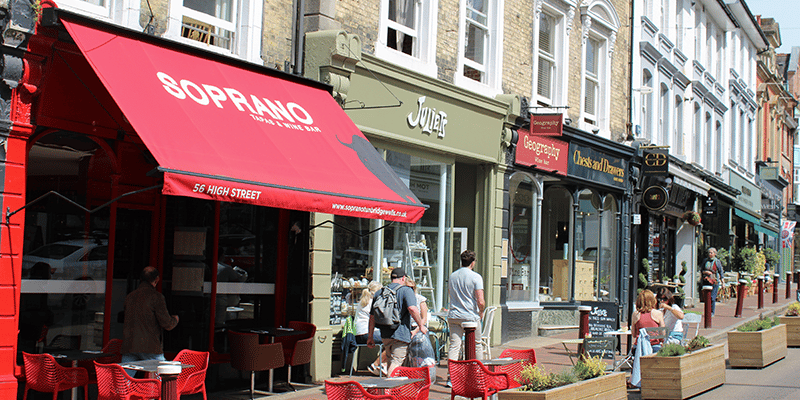From July 2020, government slashed the cost and consultation period for obtaining a pavement license, and eased planning restrictions for marquees.
Following a consultation, the government said last December that it would make pandemic hospitality measures permanent.
Over that period, the look of Tunbridge Wells has changed, notably on the High Street, with the introduction of a one-way system. But plastic barriers were installed to create space for social distancing and for pavement dining, prompted complaints that they were ‘ugly’, ‘unsightly’, and ‘unwelcoming’.
Now, however, the High Street is lined with tables – some in the road, protected by wooden planters, as pubs, restauranteurs and café owners throughout the town took advantage of cheaper licenses for outdoor seating and stalls.
Relaxed planning regulations allowed them to erect gazebos or use car parks and terraces as dining and drinking areas, under existing seating licenses.
Now, the Government is proposing to make alfresco dining a thing of the future as well as of the pandemic past.
Legislation included in the Queen’s Speech earlier this month heralded the proposed Levelling Up and Regeneration Bill.
One of the main elements included ‘Giving residents more of a say over changing street names and ensuring everyone can continue to benefit from alfresco dining’, according to a government briefing note.
David Martin, of The Lodge coffee shop, with a café on the High Street, bought the business just two weeks before lockdown, with an existing business model of a few outside tables under an awning, then reached an agreement with his neighbour to add tables to the private land in front of their business, to take advantage of the ‘sun trap’.
“People have become more in tune with eating alfresco,” he said, adding: “I would say 80 per cent of our people sitting outside don’t even smoke.”
‘We’ve been pushing alfresco dining for over 10 years and have grown our 80-seat terrace into a 200-person terrace’
The Pantiles showed long ago that outdoor entertainment can work locally, and certainly in Tunbridge Wells, according to Julian Leefe- Griffiths, owner of The Tunbridge Wells Hotel and one of the Jazz on the Pantiles festival organisers.
“We’ve been pushing alfresco dining for over 10 years. Since 2012, we’ve grown our 80-seat terrace into a Continental-style 200-person terrace.”
In a nod to the British weather, he said the restaurant had invested in marquee cover for the tables – but had got rid of patio heaters a few years ago, in favour of recycled wool blankets.
The decision was initially for environmental reasons, but was now reinforced by the cost of energy, he added. “It’s a bit like setting fire to £20 notes in a bucket.”
At TN1 Bar & Kitchen, alfresco dining has only just become a reality, said owner Murat Askin.
The old ASK Italian restaurant on Monson Road never offered outside dining, but following the change of business last year, TN1 introduced outdoor tables about a month ago, both behind the restaurant in its courtyard area and on the pavement of Monson Road.
“We only redecorated and put the tables out about a month ago,” he told the Times, adding that although the tables were sheltered with awnings or umbrellas, ‘people do still sit inside, because the temperature is not always right.’
Meanwhile, the restaurant is getting ready to extend its season, he said.
“We are just waiting for the electrician to install the power supply for the heaters.”
Although the business did have a few tables at the side of Monson Road, the majority of the business’s outdoor tables were in the courtyard.
“We have our place in the courtyard on the side of the building.”
Alfresco dining is not just for lunch, Murat stressed: “We start at 9am with breakfast and coffee and pastries, then lunch, and after 3pm we serve dinner.”








